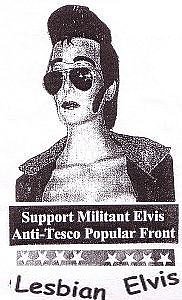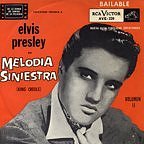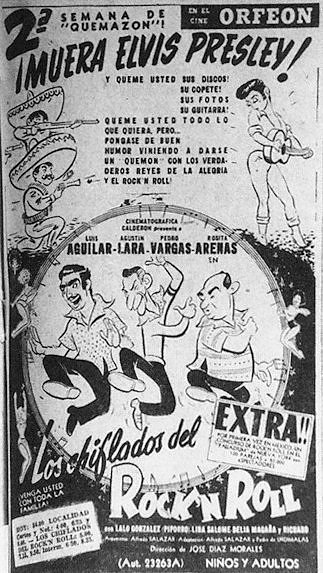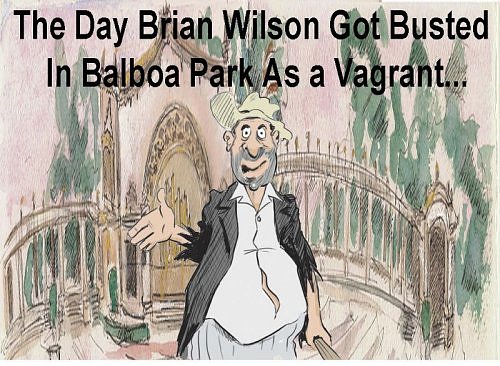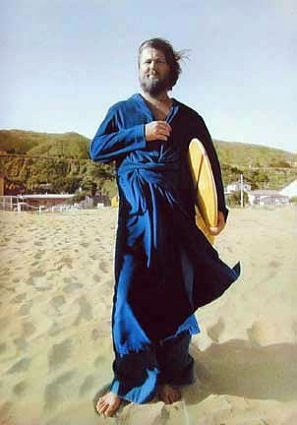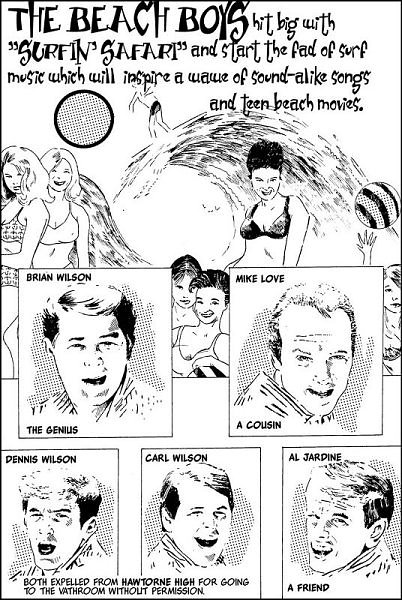 |
 |

WHY MEXICANS HATED ELVIS! #1 By Jay Allen Sanford | San Diego Reader More reasons Why Mexicans Hated Elvis ............................................................................................................................... May 1959: While Elvis Presley’s popularity in the U.S. was arguably at its all-time peak, Mexico was in the midst of a huge anti-Elvis backlash.
Tijuana tabloids called him a racist and homosexual, after the singer reportedly told gossip columnist Federico de León "I'd rather kiss three black girls than a Mexican." A Mexican woman in the same column was quoted saying "I'd rather kiss three dogs than one Elvis Presley.” Mexican Radio Exitos read de León's column over the air and spearheaded a boycott of the "insolent artist," while the powerful student group Federación Estudiantil Universitaria (FEU) held public record burnings. The book "Refried Elvis: The Rise of the Mexican Counterculture" (Berkeley: University of California Press, c1999) claims the original Elvis quote was fabricated. According to author Eric Zolov, “Herbe Pompeyo of Polygram Records in Mexico City claims that a high-up Mexican political figure wanted to contract Presley for a private party, for which he sent the performer a blank check to fill in as he wished. Presley, according to the story, returned the blank check, so the politico, extremely offended, invented the storyline about Elvis not liking Mexican women.” Who could have imagined that, four decades later, Mexico would be producing more Elvis velvet paintings than any other region in the world… …not to mention giving us “El Vez, the Mexican Elvis….”
WHY MEXICANS HATED ELVIS! #2 Culture Wars & the Backlash against Elvis (from the book, Refried Elvis: The Rise of the Mexican Counterculture by Eric Zolov) The emergent cultural wars over rock 'n' roll, however, took a dramatic turn shortly thereafter. On 19 February a comment gleaned from an alleged border interview with Elvis Presley appeared in a sidebar of the gossip columnist, Federico de León, in which the rock 'n' roll star was quoted as saying, "I'd rather kiss three black girls than a Mexican." Two days later, a Mexican woman was quoted in the same column as saying, "I'd rather kiss three dogs than one Elvis Presley."
Fallout from the alleged comment, true or false, nonetheless had an immediate impact on the direction of public discourse. What is especially interesting is the way in which this response was couched in gendered terms, rather than directly challenging the comment as racist. Radio Exitos, which only a short time before had received accolades for its exclusive interview with Presley, announced that it was now leading a boycott of the "insolent artist" after having read de León's column over the air. The station, described as "enjoying the largest youth audience in the capital," reportedly received "thousands of telephone calls from all social strata supporting the decision to completely suppress [Presley's] records." The reporter who filed this story made little effort to hide his bias: "Quite commendable is the action taken by this radio station, which spontaneously came out in defense of the dignity of Mexican women." Next to the article is a large photograph of Presley, mouth open and eyes angled downward, in an open-collared shirt and sports jacket. The caption reads, "He's very manly," an assertion mocked by the accompanying text: "Dressed in woman's clothing, nobody would say he's a man." That Presley had gone from the epitome of virility to being called a transvestite was actually a short leap in gendered logic. By challenging the traditional boundaries of dance performance—for a man, shaking hips and contorting lips were considered "feminine" gestures—Presley had actually made himself vulnerable to the charge of maricón (homosexual). Attacking Presley thus became linked to a reaffirmation of Mexican masculinity, which had been undermined not only by the popularity of this imported idol (who shook his hips and sneered) but also by the "modern values" he heralded. His emasculation by the press can best be described as a rhetorical strategy for the strengthening of a heroic nationalism subverted by the transnational mass media. The latter were blamed for having introduced competing male icons of authority and, thus, for displacing an image of youth as obedient and of women, in particular, as the bearers of "proper education and values." Presley had institutionalized a gaze of defiance and a gesture of chaos—the confrontational, unbounded territory introduced by rock 'n' roll—which challenged society by its direct appeal to youth. After all, it was Presley and his ilk who, by seducing the hearts of young Mexican women (and inducing Mexican men to mimic him), had cast a spell on countless youth, drawing them away from the traditional values and national heroes propagated by the PRI. Questioning Presley's manliness was one way of undermining his authority as a sex symbol and role model. The uproar over Presley's alleged remark came just days before the release of a musical-spoof film entitled Los chiflados del rock'n roll . By examining the transformation in marketing of this film we capture a glimpse of the significance of the Presley uproar. Roughly translated as, "Crazed for Rock'n Roll," the film featured renowned ranchera performers Agustín Lara, Pedro Vargas, and Luis Aguilar and thus fell well within the boundaries of a discourse on rock 'n' roll as novel musical style rather than youth rebellion. A reviewer noted that the film "neither exalted Presley, nor had the slightest relationship with his excesses." But the timing was such that the producer, Guillermo Calderón, faced pressures from groups organizing against Elvis Presley to prevent the film's release. Overnight, advertisements for the movie changed dramatically to incorporate the dispute over Presley. Whereas earlier advertisements had featured caricatured drawings of the featured artists, now they juxtaposed a series of well- armed, male "revolutionary" fighters (in large sombreros) firing point blank at a feminized Elvis Presley—tight pants revealing hips distorted to exaggeration—under the heading, "Die Elvis Presley!". Cheering on these "revolutionaries" are drawings of full-busted women in bikinis, Playboy-bunny versions of the legendary adelitas (female followers of the revolutionary struggle). During this same period, leaders of the Federación Estudiantil Universitaria (FEU), a powerful student group linked to conservative elements of the government, planned "a gigantic protest against the dancer and actor ... during which there will be a 'burning' of [Presley's] records ... who, in public declarations, sought to defile the Mexican Woman." Playing on this theme of a public bonfire, a subsequent advertisement for Los chiflados announced that the film was in its "second 'burning' week!" The text continued:
A different advertisement for the film played even more directly on the idea of Mexican machismo as the safeguard of patriarchal values, this time by linking it with rock 'n' roll itself: "Long live the authentic kings of rock 'n' roll, valiant and 'profligate' ... but incapable of lacking respect for a woman!" Adding emphasis to the notion that Mexican men were in fact superior to their U.S. counterparts, the text continued: "Even if she's light-skinned [güera ] and doesn't speak Spanish!" Mexicans, in other words, did not need an outsider to teach them how to be "real men." Moreover, they had their own men capable of performing rock 'n' roll (e.g. Agustín Lara), but within the gendered boundaries of respect that delineated buenas costumbres. This respect presumably preserved the modernizing aspects of rock 'n' roll along with its machismo, while policing it from falling into desmadre. Complicating the public's response to Presley's remark were the contradictions encoded in the youth culture itself. On one hand, rock 'n' roll symbolized the leveling of an older order. The rock 'n' roll gesture—characterized by rupture and defiance—directly challenged the steady gaze of parental authority, substituting rebellion for obedience. 30 Years Ago Last Month: Brian Wilson Picked Up As a Vagrant in Balboa Park By Jay Allen Sanford | San Diego Reader
In late 1976, mercurial Beach Boy Brian Wilson was complaining about round-the-clock “treatment” administered by Beverly Hills shrink Dr. Eugene E. Landy, a controversial mental health guru who, with his staff, essentially dictated and controlled his subject’s every move. Landy was later fired by band management, after it was discovered the doctor’s $90 hourly/$10,000 monthly salary had doubled. However, Wilson's new therapist Steve Schwartz was soon killed in a rock-climbing accident and before long the songwriter’s delicate mental and emotional equilibrium was, as Landy might say, “disharmonious.” In June 1978, Wilson - without telling his wife or fellow bandmembers - decided (inexplicably) to escape his life entirely and hitchhike to Mexico. He wound up in San Diego a few days later, according to Steven Gaines’ biography “Heroes And Villains,” which describes a mentally fogged pop star millionaire wandering around the city for days, “barefoot and unwashed.”
Marilyn, with Stephen and Stanley Love, came to San Diego to take Wilson home but decided to leave him at the hospital a few extra days for treatment. Wilson’s mental and physical health was precarious and the Beach Boys were scheduled to begin sessions for a new album in Florida soon. Wilson flew to meet rest of the band straight from treatment, to record the group’s debut for Caribou Records at Florida's Criteria Studios. He was quickly supplanted as producer by Bruce Johnston when it became evident that Wilson was incapable – or unwilling – to do the job.
Brian Wilson and his wife filed for legal separation in LA Superior Court July 15. Alvarado Hospital is also where, in August 1999, Brian’s daughter Carnie Wilson underwent her highly publicized laparoscopic gastric bypass (weight reduction) surgery, performed live on TV and the internet. (Thanx to Bart Mendoza for the tip and info that led to researching and writing above) Visit EIN's Elvis and Racism Archives
|
|

